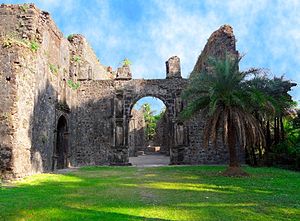

One of the more well known forts during the Maratha era, was Vasai aka Bassein located in Maharashtra’s Palghar district. Vasai was called as Bacaim during Portuguese era, belonged to what was called Provincia De Norte( Northern Province), an agriculturally rich region with crops of rice, betel nut, sugarcane. It was a major trading center from long. Around 1530, Bacaim was burnt down by the Portuguese army captain António da Silveira, forcing the ruler of Thane, to surrender the islands of Mahim and Bombain. However Bacaim was still under the rule of the Gujarat sultan Bahadur Shah. With Diu being strategically important, they attacked Bacaim then under the Governor Malik Ayaz, and managed to capture it rather easily.
Bahadur Shah was forced to sue for peace, and on 23 December 1534, he signed the Treaty of Bassein with the Portuguese, ceding Bacaim, along with Salsette, Mahim, Worli, Mazgaon, Sion and Vadgaon.. Nuno Da Cunha appointed his own brother in law Garcia De Sa, as the first Governor there in 1536 and the foundation for the fort was laid in 1538. Under Portuguese ruler Bassein( Vasai) became a major center for the Portuguese in the Konkan, as they established themselves. The fort had around 10 bastions named Cavallerio, Nossa Senhora dos Remedios, Reis Magos Santiago, São Gonçalo, Madre de Deos, São Joaõ, Elefante, Saõ Pedro, São Paulo and São Sebastião. Of these São Sebastião was the most important, also called the Porta Pia or “Pious Door”, the main entrance. It had two main gateways Porta do Mar facing the seaside, and another was Porta da Terra. 90 pieces of artillery and 70 mortars along with 21 gun boats each carrying 16 to 18 guns defended the fort.
With the arrival of St. Xavier in 1548, rampant conversions to Christiaity also occurred. However Bassein was struck by a series of disasters, first it was hit by a deadly cyclone in 1618, that devastated the city. In 1674 Arab pirates raided it, indulging in large scale massacre, looting. Also with the British, getting Bombay, Bassein lost it’s importance. The Portuguese rulers were notoriously intolerant, with forcible conversion to Christianity, discrimination against Hindus. Bassein was one of the places that bore the brunt of the Portuguese Inquisition on the West Coast. The religious intolerance of the Portuguese rulers, the atrocities during the Inquisition, the forcible conversions to Christianity, alienated most of the people in Bassein, who invited the Marathas to attack and take possession.
The Marathas captured Kalyan in 1720, and by 1737, the entire Thane region, incuding Salsette, Belapur were under their control. The only place that remained with the Portuguese were the Northern parts of Konkan, that included Mahim, Versova and Bassein. The Marathas began the siege of Bassein, on February 17, 1739, with a multi pronged attack. The Angres blocked the sea routes, while all the Portuguese outposts, were captured and the land supply routes were blocked. The Portuguese were effectively encircled.

Chimaji Appa, Baji Rao’s brother camped at Bhadrapur near Vasai, with a massive force, consisting of 40,000 infantry, 25,000 cavalry and 4500 soldiers who were expert in laying mines. Add to that around 5,000 camels, 50 elephants, and with most Maratha Sardars joining in it was a massive army. Alarmed at the huge Maratha force against them, the Portuguese decided to focus only on Vasai, Daman, Diu and Uran.This helped the Marathas to easily capture Bandra, Versova, Mahim.Chimaji Appa was joined by Manaji Angre, in April 1739, as the Portuguese were fully cut off.
Angre captured Uran in March 1739 from the Portuguese, followed by easy victories at Bandra, Versova and DharaviThe Marathas had by now captured all the territory around Vasai, giving them full control of the region, cutting off all access to the Portuguese on land and even on sea, with the Angres blocking the ship there. Chimaji Appa now turned his focus on Bassein fort which was surrounded by the Vasai Creek on two sides and the Arabian Sea on another side.

The siege of Vasai Fort began on May 1, 1739 with Chimaji Appa laying 10 mines near the tower of Remedios. As the walls were breached, the Marathas rushed into the fort, under heavy Portuguese fire. Along with Appa, Malhar Rao Holkar, Ranoji Scindia too led the charge, around 4000 Marathas stormed into the Vasai fort breaching the towers of Remedios and San Sebastian, under intense Portuguese firing. It was a pitched battle, with the Portuguese resolutely digging in and the Marathas pushing in large numbers.
By May 3, the Marathas breached the tower of São Sebastião , capturing the fort of Vasai, after a 2 month long siege. Chimaji Appa sent an ultimatum to the Portuguese that unless they surrendered, the entire garrison would be massacred, and the Governor surrendered on May 16th.
May 23rd, 1739
The Saffron flag flew over the Fort of Vasai. One of the greatest victories of the Marathas, the Portuguese lost control over the Konkan, restricted now just to Goa. Chimaji Appa’s conquest of the West Coast, is as great an achievement as his more illustrious brother’s campaigns in the Deccan and Malwa. His son Sadashiv Rao Bhau, was the one who headed Maratha army at Panipat.

It was not just Vasai, the Portuguese lost eight cities, four chief ports, twenty fortress, two fortified hills and 340 villages, to Chimaji Appa. The Vajreshwari Temple, was built by him as a thanksgiving to the Goddess after his victory at Bassein. In fact after Chimaji Appa won at Vasai, he collected 5 large bells, one of which he placed at Vajreshwari Temple. The other bells were offered to temples at Bhimshankar, Menavali near Wai, Omkareshwar and Ramlinga temple at Shirur.
